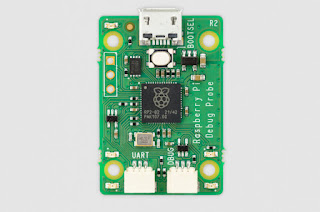Raspberry Pi Debug Probe and C/C++ SDK & Tools Easy Install on Windows
In an unexpected move, the Raspberry Foundation announced the Raspberry Pi Debug Probe, an interesting accessory for the Pico boards (and other boards with ARM microcontrollers).
 |
| The Debug Probe board |
A few days later, they announced the Raspbery Pi Pico Windows Installer for easier installation of the SDK and the complete toolchain needed for developing C/C++ for the Picos under Windows.
The Debug Probe is a commercial version of the picoprobe (described in the Getting Started with Raspberry Pi Pico document). Like other ARM based microcontroller, the RP2040 includes debugging facilities accessible through an SWD (Serial Wire Debug) port. This port requires two signals, SWIO (data) and SWCLK (clock), plus ground connections. Its use boils down to controlling this signals according to a protocol.
The picoprobe is an normal Raspberry Pi Pico running an special firmware to make it act as an "SWD bridge". It is pretty simple to connect the picoprobe to another Pico (the target of the debugging) . With a little more effort you can get the OpenOCD debugger working, even inside Visual Code.
 |
| My take on the picoprobe |
The picoprobe (and the Debug Probe) can also be used as a serial to USB adapter for any kind of asynchronous (UART) communication at 3.3V.
- Arm GNU Toolchain
- CMake
- Ninja
- Python 3.9
- Git for Windows
- Visual Studio Code
- OpenOCD
- Pico C/C++ SDK




Comments
Post a Comment